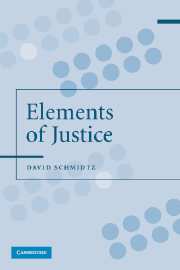Book contents
- Frontmatter
- Contents
- Acknowledgments
- PART 1 WHAT IS JUSTICE?
- PART 2 HOW TO DESERVE
- 6 Desert
- 7 What Did I Do to Deserve This?
- 8 Deserving a Chance
- 9 Deserving and Earning
- 10 Grounding Desert
- 11 Desert as Institutional Artifact
- 12 The Limits of Desert
- PART 3 HOW TO RECIPROCATE
- PART 4 EQUAL RESPECT AND EQUAL SHARES
- PART 5 MEDITATIONS ON NEED
- PART 6 THE RIGHT TO DISTRIBUTE
- References
- Index
11 - Desert as Institutional Artifact
Published online by Cambridge University Press: 05 June 2012
- Frontmatter
- Contents
- Acknowledgments
- PART 1 WHAT IS JUSTICE?
- PART 2 HOW TO DESERVE
- 6 Desert
- 7 What Did I Do to Deserve This?
- 8 Deserving a Chance
- 9 Deserving and Earning
- 10 Grounding Desert
- 11 Desert as Institutional Artifact
- 12 The Limits of Desert
- PART 3 HOW TO RECIPROCATE
- PART 4 EQUAL RESPECT AND EQUAL SHARES
- PART 5 MEDITATIONS ON NEED
- PART 6 THE RIGHT TO DISTRIBUTE
- References
- Index
Summary
Thesis: Desert has institutional and preinstitutional aspects.
JUSTICE – INSTITUTIONAL AND NATURAL
To Feinberg, “desert is a natural moral notion (that is, one which is not logically tied to institutions, practices, and rules).” Rawls denies that desert is natural in this sense, but concedes the legitimacy of desert claims as institutional artifacts. Thus, faster runners deserve medals according to rules created for the express purpose of giving medals to faster runners. Those who “have done what the system announces it will reward are entitled to have their expectations met. In this sense the more fortunate have title to their better situation; their claims are legitimate expectations established by social institutions and the community is obligated to fulfill them. But this sense of desert is that of entitlement. It presupposes the existence of an ongoing cooperative scheme.…” The idea is that at some point we will be in a position to define, then acknowledge, claims of desert, but such claims (1) will have no standing outside the context of particular institutional rules, and therefore (2) cannot bear on what rules we should have in the first place.
Other senses of desert, though, are less closely tied to institutional structures. A medalist who trains for years deserves admiration in a way that a medalist who wins purely on the strength of genetic gifts does not, even when the two are equally deserving of medals by the lights of the institutional rules.
- Type
- Chapter
- Information
- The Elements of Justice , pp. 62 - 65Publisher: Cambridge University PressPrint publication year: 2006



